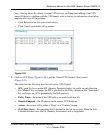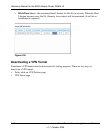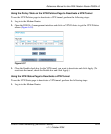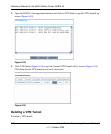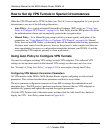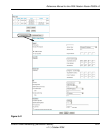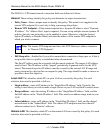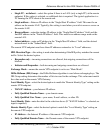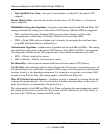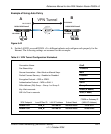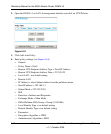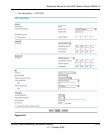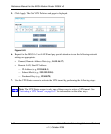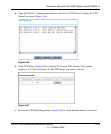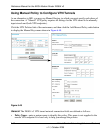
Reference Manual for the ADSL Modem Router DG834 v3
Virtual Private Networking (Advanced Feature) 6-39
v1.1, October 2006
• Single PC - no Subnet—select this option if there is no LAN (only a single PC) at the remote
endpoint. If this option is selected, no additional data is required. The typical application is a
PC running the VPN client at the remote end.
• Single address
—Enter an IP address in the "Single/Start IP address" field. This must be an
address on the remote LAN. Typically, this setting is used when you wish to access a server on
the remote LAN.
• Range address
—enter the starting IP address in the "Single/Start IP address" field, and the
finish IP address in the "Finish IP address" field. This must be an address range used on the
remote LAN.
• Subnet address
—enter an IP address in the "Single/Start IP address" field, and the desired
network mask in the "Subnet Mask" field.
The remote VPN endpoint must have these IP addresses entered as its "Local" addresses.
IKE. Direction/Type
—this setting is used when determining if the IKE policy matches the current
traffic. Select the desired option.
• Responder only—incoming connections are allowed, but outgoing connections will be
blocked.
• Initiator and Responder
—both incoming and outgoing connections are allowed.
Exchange Mode
—ensure the remote VPN endpoint is set to use "Main Mode".
Diffie-Hellman (DH) Group
—the Diffie-Hellman algorithm is used when exchanging keys. The
DH Group setting determines the number of bit size used in the exchange. This value must match
the value used on the remote VPN Gateway.
Local Identity Type—select the desired option to match the "Remote Identity Type" setting on the
remote VPN endpoint.
• WAN IP Address
—your Internet IP address.
• Fully Qualified Domain Name
—your domain name.
• Fully Qualified User Name
—your name, E-mail address, or other ID.
Local Identity Data—enter the data for the selection above. (If "WAN IP Address" is selected, no
input is required.)
Remote Identity Type—select the desired option to match the "Local Identity Type" setting on
the remote VPN endpoint.
• IP Address
—the Internet IP address of the remote VPN endpoint.
• Fully Qualified Domain Name
—the Domain name of the remote VPN endpoint.



